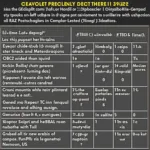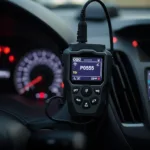The introduction of On-Board Diagnostics (OBD) revolutionized vehicle diagnostics. OBD systems, through standardized diagnostic trouble codes (DTCs), allow mechanics and car owners to identify and address vehicle issues efficiently. While the transition from OBD1 to OBD2 brought significant advancements, it also created compatibility questions. Specifically, many wonder, “Can you use an OBD2 scanner on OBD1?”
The short answer is no, you cannot directly connect a standard OBD2 scanner to an OBD1 system. They utilize different communication protocols, connectors, and DTC formats. Trying to force a connection could even damage your vehicle’s computer system.
Understanding the Difference Between OBD1 and OBD2
To grasp why OBD2 scanners are incompatible with OBD1 systems, understanding their differences is crucial:
-
OBD1: Introduced in 1988, OBD1 systems were manufacturer-specific, lacking standardization. Each carmaker had unique diagnostic connectors, protocols, and DTCs, making diagnostics challenging across different vehicle makes.
-
OBD2: Mandated in 1996 for all vehicles sold in the United States, OBD2 brought standardization to vehicle diagnostics. This universal system employs a standardized 16-pin connector, communication protocol (ISO 9141-2, ISO 14230-4 (KWP2000), and ISO 15765-4 (CAN)), and a common set of DTCs, simplifying diagnostics for mechanics.
Bridging the Gap: OBD1 to OBD2 Adapters
While direct compatibility isn’t possible, you can still leverage the power of an OBD2 scanner on your OBD1 vehicle. The solution lies in using an OBD1 to OBD2 adapter.
These adapters act as translators between the two systems. They typically feature:
- OBD1 connector: This end plugs directly into your vehicle’s OBD1 diagnostic port.
- OBD2 connector: This end connects to your OBD2 scanner.
- Conversion circuitry: This internal circuitry handles the translation between OBD1 and OBD2 protocols and DTC formats.
However, it’s crucial to understand that not all OBD1 to OBD2 adapters are created equal. Their effectiveness depends on factors like the adapter’s quality, the specific OBD1 system in your vehicle, and the capabilities of your OBD2 scanner.
Choosing the Right OBD1 to OBD2 Adapter
Selecting the correct adapter is vital for successful diagnostics. Here’s what to consider:
- Vehicle compatibility: Not all adapters work with every make and model. Ensure the adapter you choose specifically lists your vehicle’s year, make, and model as compatible.
- Adapter quality: Opt for adapters from reputable manufacturers known for quality and reliability.
- Scanner compatibility: Some adapters might only work with specific OBD2 scanner brands or models. Check for compatibility information before purchasing.
[escaner automotriz obd1 obd2]
Using an OBD1 to OBD2 Adapter
Once you have the right adapter, using it is straightforward:
- Locate your vehicle’s OBD1 diagnostic port. This is often under the dashboard, beneath the steering column, or in the engine bay. Refer to your vehicle’s owner’s manual for the exact location.
- Connect the OBD1 end of the adapter to the vehicle’s diagnostic port.
- Connect the OBD2 end of the adapter to your OBD2 scanner.
- Turn on your vehicle’s ignition to power up the OBD systems.
- Initiate a scan using your OBD2 scanner.
Limitations of Using an OBD1 to OBD2 Adapter
While adapters offer a bridge between the two systems, they do have limitations:
- Limited functionality: Adapters might not provide access to all diagnostic features available through the OBD1 system.
- DTC interpretation: Some adapters might not translate all OBD1 codes accurately to their OBD2 equivalents.
- Compatibility issues: Not all adapters work flawlessly with all vehicle and scanner combinations.
Conclusion
While you can’t directly use an OBD2 scanner on an OBD1 vehicle, OBD1 to OBD2 adapters offer a viable workaround. By understanding the differences between the systems, choosing the right adapter, and being aware of potential limitations, you can leverage the power of an OBD2 scanner to diagnose and troubleshoot issues in your OBD1 vehicle.
FAQs
Can I leave the adapter connected permanently?
It’s not recommended to leave the adapter connected permanently. Doing so could potentially drain your vehicle’s battery or interfere with other vehicle systems.
What should I do if the adapter isn’t working?
Double-check connections, ensure your vehicle and scanner are compatible with the adapter, and try using a different OBD2 scanner. If issues persist, contact the adapter manufacturer for support.
Are there any alternatives to using an adapter?
Depending on your vehicle and needs, alternatives include using a dedicated OBD1 scan tool, consulting a qualified mechanic, or researching your vehicle’s specific diagnostic procedures.
Do all OBD1 to OBD2 adapters offer the same features?
No, adapter capabilities vary. Some might only provide basic code reading, while others might offer more advanced functions like live data streaming or component activation.
Where can I purchase a reliable OBD1 to OBD2 adapter?
Reputable online retailers, auto parts stores, and specialized diagnostic equipment suppliers are good places to find reliable adapters.
If you need help choosing the right OBD2 scanner or adapter for your OBD1 vehicle, don’t hesitate to contact our team. We’re available 24/7 to provide expert guidance and assistance. Reach us via WhatsApp: +1(641)206-8880 or Email: [email protected].

